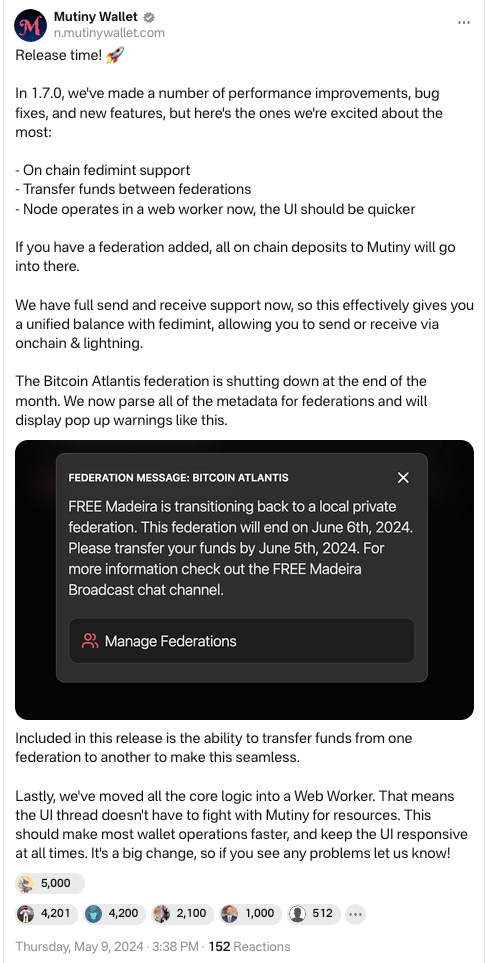Ten31 Timestamp 843,004
Consumer sentiment deteriorated sharply this week – even as stock indices pushed back near all-time highs once again – as jobless claims jumped, credit card delinquencies continued to pile up, and forward inflation expectations increased. Meanwhile, noteworthy battle lines appear to be forming in Washington, as the US House of Representatives voted to overturn a rule preventing banks from custodying bitcoin – an interesting development as quarterly 13F filings show growing institutional exposure to bitcoin ETFs – only for that vote to be immediately met with the threat of a veto from President Biden. Shortly thereafter, Republican Presidential candidate Donald Trump made his latest set of pro-“crypto” comments to a crowd of supporters, highlighting what appears to be an increasingly partisan divide over bitcoin and other cryptocurrencies. While we take no view on any particular candidate and are generally skeptical of most political posturing related to bitcoin, it’s notable that this debate is a talking point at all on the national stage – particularly after over a decade of weekly bitcoin obituaries – and we wouldn’t be surprised to see this political division intensify heading into the 2024 Presidential election, particularly if the average American continues to become more financially stressed.
Portfolio Company Spotlight
Coinkite develops and manufactures best in class consumer tools for interacting with bitcoin, including the Coldcard – a highly secure hardware signing device that sets the standard for private key custody – physical bearer instruments (Opendime and Satscard), an NFC-enabled card for signing transactions (Tapsigner), the newly released Q hardware wallet, and much more. The company’s product portfolio balances security with usability and includes some of the most widely used products in the bitcoin ecosystem among both consumers and institutions.
Selected Portfolio News
Mutiny released its latest update, which includes full support for on-chain transactions with fedimints and other improvements:
Coinkite’s Coldcard Q is now broadly available:
Media
Strike Founder and CEO Jack Mallers appeared on the What Bitcoin Did podcast.
Primal Founder and CEO Miljan Braticevic joined the Stephan Livera podcast to give an overview of the Nostr protocol and Primal’s contribution to the ecosystem.
Zaprite Head of Business Development and Ten31 Advisor Parker Lewis joined the TFTC podcast to discuss the state of the dollar and bitcoin’s role in the future of the US.
Strike published a blog post walking through the technical process of migrating a lightning node.
Market Updates
The week was full of updates pointing to a more challenging environment for the average American. To kick off the week, the latest initial unemployment claims data came in at 231,000, up more than 10% M/M to the highest level since last August.
Meanwhile, credit card delinquencies have continued to rise, with the latest data marking yet another post-recession high as Citigroup CEO Jane Fraser warned that low income consumers are becoming increasingly stressed.
Alongside these updates, the University of Michigan’s popular consumer sentiment index posted a 13% M/M decline in May, substantially below consensus as consumers “now perceive negative developments on a number of dimensions,” per the survey. Notably, one-year inflation expectations also jumped 30bps to 3.5%, the highest reading since last fall.
New data released this week indicated that nearly one-third of office commercial mortgage-backed securities are now distressed, with particularly outsized vulnerability in cities like Chicago, Denver, and Houston.
The growing stress in this sector led prominent real estate investor Barry Sternlicht to project (possibly with a dash of book-talking) at least one bank failure per week on the back of nonperforming office loans.
The USDJPY exchange rate continued to hover above 155 for most of the week – just beneath recent 35-year highs – despite roughly $60 billion of suspected intervention (i.e. selling dollar-denominated assets including Treasuries) in FX markets by the Bank of Japan. US Treasury Secretary Janet Yellen would not comment on the BOJ’s actions but said she would expect “consultation to take place” before any such intervention.
As appetite for US government debt potentially begins to face headwinds on the margin from sovereigns like Japan, US money market funds – which collectively manage more than $6 trillion in assets – are increasingly shifting weightings toward government debt thanks to upcoming SEC rule changes.
The bitcoin network surpassed 1 billion cumulative transactions this week as the network underwent its largest downward difficulty adjustment since 2022 alongside an all-time low hashprice.
The first wave of quarterly 13F filings since the launch of spot bitcoin ETFs continued to roll in this week, with the latest submissions showing bitcoin ETF exposure among institutions including JPMorgan Chase, Wells Fargo, and Susquehanna (though it’s uncertain how much of this exposure relates to market making activities for the ETFs).
Regulatory Update
Illinois Congressman Sean Casten introduced the “Blockchain Integrity Act” to Congress this week. The proposed bill would enact a two-year moratorium on financial institutions interacting with cryptocurrency funds that have used privacy-enhancing technologies.
The US House voted to overturn SAB-121, an SEC rule barring financial institutions from custodying bitcoin. However, President Biden’s office immediately indicated the executive branch would veto any such rule change.
Republican Presidential candidate Donald Trump told a crowd of supporters this week that he was “good with crypto,” a comment directionally in keeping with his recent tone change toward bitcoin.
Noteworthy
Prominent USD stablecoin Tether announced new surveillance and compliance measures it will enforce in partnership with Chainalysis.
Popular bitcoin advocate Junseth conducted an informative interview with a prolific social engineering attacker detailing the various methods such attackers use for manipulating targets into giving up funds. The interview serves as the latest reminder of both the dangers of centralized pools of user data that can be exploited to identify potential victims as well as the importance of tools like hardware wallets and multi-signature vaults.
Travel
Austin BitDevs, May 16
Bitcoin 2024, July 25-27
BitcoinMENA, Dec 9-10






